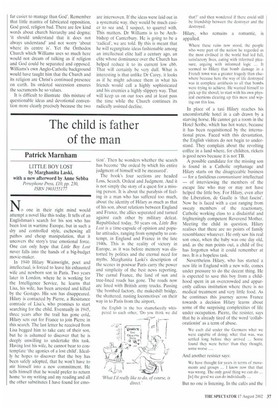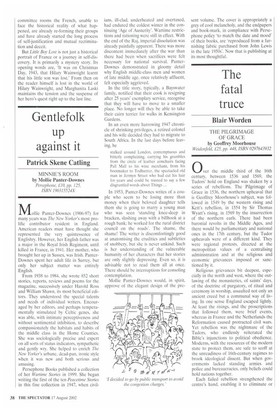The child is father of the man
Patrick Marnham
LITTLE BOY LOST by Marghanita Laski, with a new afterword by Anne Sebba Persephone Press, 110, pp. 230, ISBN 1903155177 N0 one in their right mind would attempt a novel like this today. It tells of an Englishman's search for his son who has been lost in wartime Europe, but in such a dry and controlled style, eschewing all pathos and cheap manipulation, that it uncovers the story's true emotional force. One can only hope that Little Boy Lost never falls into the hands of a big-budget movie-maker.
In 1940 Hilary Wainwright, poet and intellectual, is forced to leave his exhausted wife and newborn son in Paris. Two years later in London, where he is working for the Intelligence Service, he learns that Lisa, his wife, has been arrested and killed by the Gestapo. His son has disappeared. Hilary is contacted by Pierre, a Resistance comrade of Lisa's, who promises to start searching for the child. Eventually in 1945, three years after the trail has gone cold, Hilary sets out for France to join Pierre in this search. The last letter he received from Lisa begged him to take care of their son, but he is ashamed to discover that he is deeply unwilling to undertake this task. Having lost his wife, he cannot bear to contemplate 'the agonies of a lost child'. Ideally he hopes to discover that the boy has been safely adopted, that he won't have to stir himself into a new commitment. He tells himself that he would prefer to return home 'to my writing and my reading and all the other substitutes I have found for emo
tion'. Then he wonders whether the search has become 'the ordeal by which his entire judgment of himself will be measured'.
The book's four sections are headed Loss, Search, Ordeal and Judgment. And it is not simply the story of a quest for a missing person. It is about the paralysis of feeling in a man who has suffered too much, about the identity of Hilary as much as that of his son, about relations between England and France, the allies separated and turned against each other by military defeat. Republished today, 50 years on, Little Boy Lost is a time-capsule of opinion and popular attitudes, ranging from sympathy to contempt, in England and France in the late 1940s. This is the reality of victory in Europe, as it was before memory was distorted by politics and the eternal need for myths. Marghanita Laski's description of the scenes in postwar Paris carry the power and simplicity of the best news reporting. The carnal France, the land of sun and tree-lined roads has gone. The roads now are lined with British army trucks. Passing 'the bombed factory, the makeshift bridge, the shattered, rusting locomotives' on their way in to Paris from the airport,
the English in the bus shamefacedly whispered to each other, 'Do you think we did that?' and then wondered if there could still be friendship between the destroyer and the destroyed.
Hilary, who remains a romantic, is appalled.
Where these ruins now stood, the people who were part of the nation he regarded as the most civilised in the world had led full, satisfactory lives, eating with informed pleasure, arguing with informed logic ... It seemed to Hilary that bomb damage in a French town was a greater tragedy than elsewhere because here the way of life destroyed was in complete antithesis to all that bombs were trying to achieve. He wanted himself to pick up the shovel, to start with his own physical exertions clearing up this mess and wiping out this loss.
In place of a taxi Hilaty reaches his uncomfortable hotel in a cab drawn by a starving horse. He cannot get a room in the Hotel Scribe, which has hot water, because it has been requisitioned by the international press. Faced with this devastation, the English visitors do not begin to understand. They complain about the revolting coffee in a land where, for children, rickets is good news because it is not TB.
A possible candidate for the missing son is found in a Catholic orphanage and Hilary starts on the disagreeable business — for a fastidious communisant intellectual — of interviewing the members of the escape line who may or may not have helped the little boy. For Hilary, even after the Liberation, de Gaulle is 'that fascist'. Now he is faced with a cast ranging from sweaty members of the reactionary, Catholic working class to a disdainful and frighteningly competent Reverend Mother. Meeting the child in question, Hilary realises that there are no points of family resemblance whatever. He only saw his real son once, when the baby was one day old, and, as the nun points out, a child of five has forgotten what it could remember at two. It is a hopeless task.
Nevertheless Hilary, who has started a new life in England with a new wife, comes under pressure to do the decent thing. He is expected to save this boy from a childhood spent in an overcrowded and apparently callous institution where there is no medical treatment and very little food. As he continues this journey across France towards a decision Hilary learns about some of the surprising complexities of life under occupation. Pierre, the resister, says that he is already tired of the word 'collaborationist' as a term of abuse.
We each did under the Germans what we were capable of doing; what that was, was settled long before they arrived ... Some found they were better than they thought, some worse ....
And another resister says:
We have thought for years in terms of movements and groups ... I know now that that was wrong. The only good thing we can do ... [is] the good we can do individually ...
But no one is listening. In the cafés and the committee rooms the French, unable to face the historical reality of what happened, are already re-forming their groups and have already started the long process of self-justification and mutual recrimination and deceit.
But Little Boy Lost is not just a historical portrait of France or a journey in self-discovery. It is primarily a mystery story. Its opening words are, 'It was on Christmas Day. 1943, that Hilary Wainwright learnt that his little son was lost.' From then on the reader himself is lost in the world of Hilary Wainwright, and Marghanita Laski maintains the tension and the suspense of her hero's quest right up to the last line.































































 Previous page
Previous page